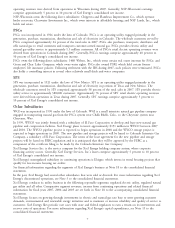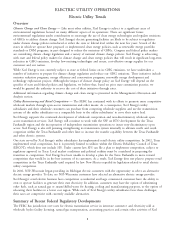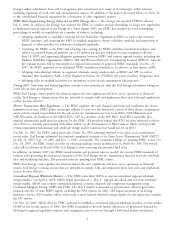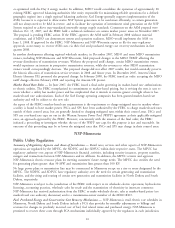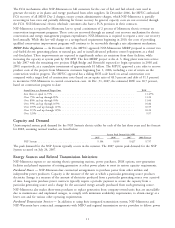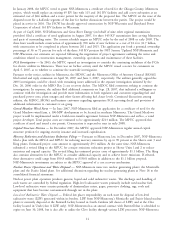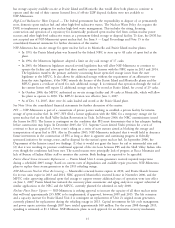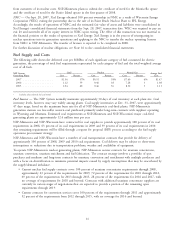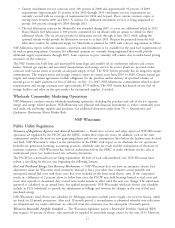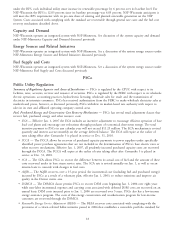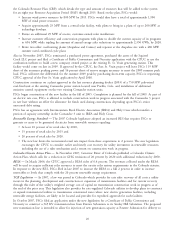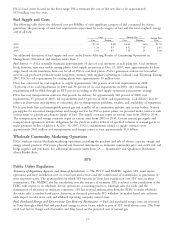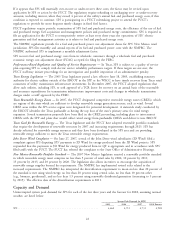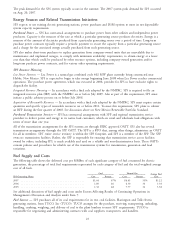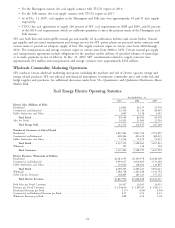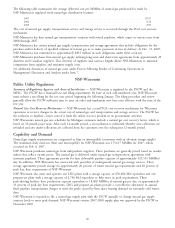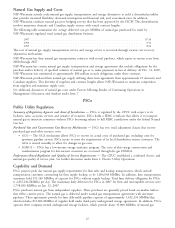Xcel Energy 2007 Annual Report Download - page 27
Download and view the complete annual report
Please find page 27 of the 2007 Xcel Energy annual report below. You can navigate through the pages in the report by either clicking on the pages listed below, or by using the keyword search tool below to find specific information within the annual report.• Current enrichment services contracts cover 100 percent of 2008 and approximately 94 percent of 2009
requirements. Approximately 29 percent of the 2010 through 2013 enrichment services requirements are
currently covered with no coverage of requirements for 2014 and beyond. These current contracts expire at
varying times between 2009 and 2013. A contract for additional enrichment services is being negotiated to
provide 100 percent coverage for 2009 through 2013.
• The fuel fabrication contract for Monticello was extended during 2007 to cover one additional reload in 2011.
Prairie Island’s fuel fabrication is 100 percent committed for six reloads with an option to extend for three
additional reloads. The six reloads provide for fabrication services through at least 2013, while adding the
optional reloads would provide for fabrication services to at least 2015. Request for proposals from the fuel
fabrication vendors for additional supply for Monticello is planned for 2008 with contract negotiations to follow.
NSP-Minnesota expects sufficient uranium, conversion and enrichment to be available for the total fuel requirements of
its nuclear generating plants. Contracts for additional uranium are currently being negotiated that would provide
additional supply requirements through 2019. Some exposure to price volatility will remain, due to index-based pricing
structures on the contracts.
The NSP System uses both firm and interruptible natural gas and standby oil in combustion turbines and certain
boilers. Natural gas supplies and associated transportation and storage services for power plants are procured under
contracts with various terms to provide an adequate supply of fuel. The NSP System presently has no long-term supply
commitments. The transportation and storage contracts expire in various years from 2010 to 2028. Certain natural gas
supply and transportation agreements include obligations for the purchase and/or delivery of specified volumes of
natural gas or to make payments in lieu of delivery. At Dec. 31, 2007, NSP-Minnesota’s commitments related to these
transportation and storage contracts were approximately $575 million. The NSP System has limited on-site fuel oil
storage facilities and relies on the spot market for incremental supplies, if needed.
Wholesale Commodity Marketing Operations
NSP-Minnesota conducts various wholesale marketing operations, including the purchase and sale of electric capacity,
energy and energy related products. NSP-Minnesota uses physical and financial instruments to reduce commodity price
and credit risk and hedge supplies and purchases. See additional discussion under Item 7A — Quantitative and
Qualitative Disclosures About Market Risk.
NSP-Wisconsin
Public Utility Regulation
Summary of Regulatory Agencies and Areas of Jurisdiction — Retail rates, services and other aspects of NSP-Wisconsin’s
operations are regulated by the PSCW and the MPSC, within their respective states. In addition, each of the state
commissions certifies the need for new generating plants and electric transmission lines before the facilities may be sited
and built. NSP-Wisconsin is subject to the jurisdiction of the FERC with respect to its wholesale electric operations,
hydroelectric generation licensing, accounting practices, wholesale sales for resale and the transmission of electricity in
interstate commerce. NSP-Wisconsin has received authorization from the FERC to make wholesale electric sales at
market-based prices (see market-based rate authority discussion).
The PSCW has a biennial base-rate filing requirement. By June of each odd-numbered year, NSP-Wisconsin must
submit a rate filing for the test year beginning the following January.
Fuel and Purchased Energy Cost Recovery Mechanisms — NSP-Wisconsin does not have an automatic electric fuel
adjustment clause for Wisconsin retail customers. Instead, it has a procedure that compares actual monthly and
anticipated annual fuel costs with those costs that were included in the latest retail electric rates. If the comparison
results in a difference of 2 percent above or below base rates, the PSCW may hold hearings limited to fuel costs and
revise rates upward or downward. Any revised rates would remain in effect until the next rate change. The adjustment
approved is calculated on an annual basis, but applied prospectively. NSP-Wisconsin’s wholesale electric rate schedules
include an FCA (wholesale) to provide for adjustments to billings and revenues for changes in the cost of fuel and
purchased energy.
NSP-Wisconsin’s retail electric rate schedules for Michigan customers include power supply cost recovery factors, which
are based on 12-month projections. After each 12-month period, a reconciliation is submitted whereby over-collections
are refunded and any under-collections are collected from the customers over the subsequent 12-month period.
Wisconsin Renewable Portfolio Standard — The Wisconsin legislature passed a Renewable Portfolio Standard (RPS)
that requires 10 percent of electric sales statewide be supplied by renewable energy sources by the year 2015. However,
17


